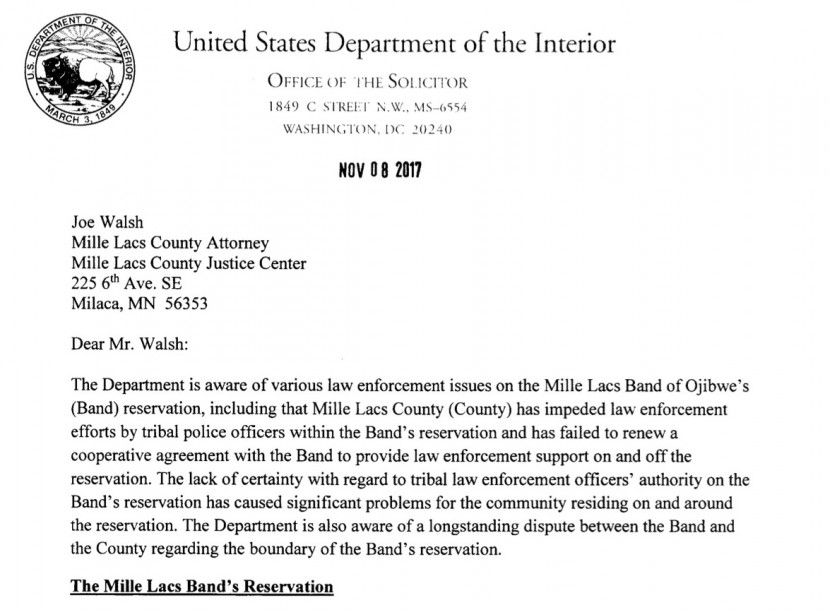
A Nov. 8 letter from the U.S. Department of Interior to Mille Lacs County Attorney Joe Walsh confirms that the 1855 Mille Lacs Reservation is still intact, and it says the County “has impeded law enforcement efforts by tribal police officers” by rescinding its law enforcement agreement with the Band. (To read the letter in its entirety, click here.
The introduction to the letter, which is signed by Harry Humbert, Deputy Assistant Secretary for Public Safety, Resource Protection and Emergency Services, says the “lack of certainty with regard to tribal law enforcement officers’ authority on the Band’s reservation has caused significant problems for the community residing on and around the reservation.”
The letter continues with a clear reaffirmation that “the Band’s reservation has not been diminished or disestablished by Congress,” referring to a November 2015 Solicitor’s Opinion on the matter. The opinion states that “the Band’s reservation remains intact despite over 100 years of encroachment by non-members and the unlawful sale of the Band’s lands by the United States.”
The County’s continued assertion that the reservation has been diminished or disestablished, the letter states, “has no basis in law and conflicts with the federal government’s longstanding position.”
The remainder of the letter concerns tribal law enforcement jurisdiction on the Reservation, saying the Band has “inherent, sovereign authority to provide for the public safety and law enforcement with regard to its own members within its reservation.”
In addition, the Secretary of Interior and Bureau of Indian Affairs has issued Special Law Enforcement Commissions (SLECs) to Mille Lacs Tribal Police officers giving them authority to conduct investigations and refer cases to the U.S. Attorney for prosecution.
This directly contradicts the County’s resolution rescinding the law enforcement agreement, which says the Band’s ability to self-refer cases under the Tribal Law and Order Act is “a direct violation” of the agreement.
The County’s resolution rescinding the agreement refers specifically to the boundary issue, saying “Mille Lacs County rejects the conclusions of the M-Opinion” while accusing the Band of using the criminal justice system to address the “disputed boundary.”
The letter suggests that it is the County that is inappropriately using the criminal justice system to create a dispute over boundaries that remain intact.
The letter’s defense of the Band’s inherent, sovereign law enforcement authority is a direct rebuke to the County’s resolution, which denies the Band’s right to enter into an Intertribal Violent Offenders Task Force Joint Powers Agreement and claims the Band exercises law enforcement authority outside its jurisdiction.
Each of the County’s reasons for rescinding the agreement has been refuted by the Band, yet the County has continued to demand extensive revisions of the agreement that would force the Band to voluntarily limit its sovereign authority.
For a copy of the county’s proposal with the county’s additions highlighted, click here.